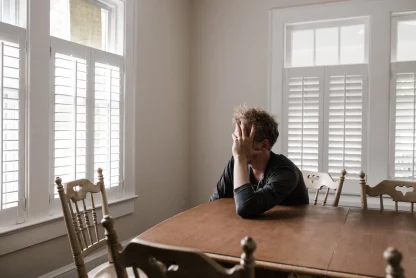Depression is a complex and debilitating mental health condition that affects millions of people worldwide. It can take a toll on a person’s emotional, physical, and social well-being, making even simple tasks seem insurmountable. Depression is not just feeling sad or down; it’s a serious medical condition that requires proper diagnosis and treatment. In this article, we will explore the causes, symptoms, and available treatments for depression. We will also discuss the impact of depression on individuals and society, as well as the importance of seeking help for those who may be struggling with this condition. By shedding light on this important topic, we hope to increase awareness and reduce the stigma associated with depression, ultimately leading to better outcomes for those who are affected.
Table of Contents
- The Signs and Symptoms of Depression, How It Affects the Brain, and the Different Types of Depression.
- A Comprehensive Overview of the Causes of Depression, Including Genetic, Environmental, and Psychological Factors.
- How Depression Can Impact Mental Wellness and Contribute to Other Mental Health Conditions.
- The Physical Symptoms of Depression, Include the Impact on Sleep, Appetite, and Energy Levels.
- How Making Changes to Diet, Exercise, and Sleep Habits Can Impact Depression Symptoms.
- The Importance of Building a Support System for Managing Depression, Including Family, Friends, and Community Resources.
- An Overview of Different Treatment Options, Including Therapy, Medication, and Alternative Therapies.
- Strategies for Coping with Depression, Include Mindfulness, Stress Reduction, and Goal Setting.
- FREQUENTLY ASKED QUESTION

The Signs and Symptoms of Depression, How It Affects the Brain, and the Different Types of Depression.
Depression is a complex and often misunderstood mental health disorder that affects millions of people worldwide. It is characterized by persistent feelings of sadness, hopelessness, and a loss of interest in activities that were once enjoyable. Depression can affect anyone regardless of age, gender, or ethnicity.
Symptoms of Depression
Depression is a mood disorder that can cause a range of symptoms. These symptoms can vary from person to person, and some people may experience only a few while others may experience many.
The most common symptoms of depression include:
- Persistent feelings of sadness, hopelessness, and emptiness.
- Loss of interest or pleasure in activities that were once enjoyable.
- Changes in appetite or weight.
- Difficulty sleeping or oversleeping.
- Fatigue or loss of energy.
- Restlessness or irritability.
- Difficulty concentrating or making decisions.
- Thoughts of death or suicide.
It is essential to note that not everyone with depression experiences all of these symptoms. If you are experiencing any of these symptoms, it is important to speak to a healthcare provider to receive an accurate diagnosis.
How Depression Affects the Brain
Depression is believed to be caused by a combination of genetic, environmental, and biological factors. Research has shown that anxiety affects the structure and function of the brain. It is thought to be caused by an imbalance of neurotransmitters, which are chemicals that regulate mood, sleep, and appetite. Specifically, dejection is associated with lower levels of serotonin, dopamine, and norepinephrine.
Studies have shown that depression can cause structural changes in the brain, specifically in the hippocampus, prefrontal cortex, and amygdala. The hippocampus is responsible for regulating memory and learning, while the prefrontal cortex is responsible for decision-making and emotions. The amygdala is responsible for processing emotions, including fear and anxiety.
A study found that people with depression had a smaller hippocampus compared to people without depression. The study suggests that dejection can cause structural changes in the brain, which can contribute to its development of it.
Different Types of Depression
There are several different types of depression, each with its own set of symptoms and causes. Understanding the different types of dejection can help with accurate diagnosis and effective treatment.
Some of the most common types include:
Major Depressive Disorder
This is the most common type of depression and is characterized by persistent feelings of sadness, hopelessness, and a loss of interest in activities that were once enjoyable.
Persistent Depressive Disorder
This type of dejection is characterized by a long-term, chronic feeling of sadness that lasts for at least two years.
Seasonal Affective Disorder
This type of depression occurs during the winter months when there is less sunlight. It is characterized by a persistent feeling of sadness, fatigue, and weight gain.
Postpartum Depression
This type of depression occurs after giving birth and is characterized by a persistent feeling of sadness, anxiety, and difficulty bonding with the baby.
Bipolar Disorder
This is a type of depression that is characterized by extreme mood swings, ranging from extreme highs (mania) to extreme lows.
A study found that there are significant differences in the structural and functional brain changes associated with different types of depression. The study found that people with the major depressive disorder had smaller hippocampal volumes compared to people with persistent depressive disorder.
Depression is a serious mental health disorder that can have a significant impact on a person’s life. It is characterized by persistent feelings of sadness, hopelessness, and a loss of interest in activities that were once enjoyable. It also affects the structure and function of the brain, specifically the hippocampus, prefrontal cortex, and amygdala. Studies have shown that dejection can cause structural changes in the brain, which can contribute to the development of dejection.
Depression is a complex mental health disorder that can cause a range of symptoms. It affects the structure and function of the brain, and there are several different types of dejection with their own set of symptoms and causes. Seeking professional help is essential for accurate diagnosis and effective treatment.
A Comprehensive Overview of the Causes of Depression, Including Genetic, Environmental, and Psychological Factors.
Genetic Factors
Genetics plays a significant role in the development of dejection. Research has shown that certain genes may increase a person’s risk of developing dejection. A study found that a variation in the serotonin transporter gene (5-HTT) was associated with an increased risk of developing depression.
Another study found that a family history of depression was a significant risk factor for its development. The study suggests that genetics play a role in the transmission of dejection from parents to children.
Environmental Factors
Environmental factors also play a significant role in the development of depression. Stressful life events, such as a job loss, divorce, or the death of a loved one, can trigger dejection in some people. A study found that stressful life events were associated with an increased risk of developing depression.
Other environmental factors that can contribute to the development of depression include:
Childhood trauma
Childhood trauma, such as physical, emotional, or sexual abuse, can increase the risk of developing depression later in life.
Chronic stress
Chronic stress, such as job-related stress, financial stress, or relationship stress, can contribute to the development of depression.
Substance abuse
Substance abuse, such as alcohol or drug abuse, can increase the risk of developing depression.
Psychological Factors
Psychological factors also play a significant role in the development of depression. Negative thinking patterns, such as self-criticism, self-blame, and negative self-talk, can contribute to the development of dejection. A study found that negative thinking patterns were associated with an increased risk of developing dejection.
Other psychological factors that can contribute to the development of depression include:
Low self-esteem
Low self-esteem can contribute to the development of depression by causing a person to feel unworthy or inadequate.
Perfectionism
Perfectionism can contribute to the development of depression by causing a person to set unrealistic expectations for themselves and feel like a failure when they cannot meet those expectations.
Learned helplessness
Learned helplessness occurs when a person feels like they have no control over their life, and can contribute to the development of depression.
Depression is a complex mental health disorder that is caused by a combination of genetic, environmental, and psychological factors. Genetics can increase a person’s risk of developing dejection, while stressful life events, childhood trauma, chronic stress, and substance abuse can contribute to the development of dejection. Negative thinking patterns, low self-esteem, perfectionism, and learned helplessness can also contribute to it.
It is essential to seek professional help if you are experiencing symptoms of depression. Treatment options include therapy, medication, or a combination of both. With proper treatment and support, it is possible to manage anxiety and improve your quality of life.
How Depression Can Impact Mental Wellness and Contribute to Other Mental Health Conditions.
Depression is a common and serious mental health condition that can significantly impact a person’s mental wellness and can lead to a range of mental health conditions and can also worsen existing mental health conditions.
Impact on Mental Wellness
Depression can impact a person’s mental wellness in various ways. It can cause feelings of sadness, hopelessness, and a lack of interest in activities that were once enjoyed. These symptoms can impact a person’s overall mental wellness by causing them to feel less fulfilled, less engaged, and less satisfied with their lives.
Dejection can also impact a person’s physical health, including appetite changes, sleep disturbances, and fatigue. These physical symptoms can also contribute to a decrease in mental wellness by making it more difficult to engage in physical activity and causing a decrease in overall energy levels.
Impact on Other Mental Health Conditions
Depression can also contribute to the development or worsening of other mental health conditions. For example, It is often comorbid with anxiety disorders, with up to 50% of people with dejection also experiencing an anxiety disorder.
It can also contribute to the development of substance use disorders. A study found that people with dejection were more likely to develop substance use disorders than those who aren’t.
It can also contribute to the development of eating disorders. A study published in the International Journal of Eating Disorders found that dejection was a significant predictor of the development of binge eating disorder.
Dejection can also worsen existing mental health conditions. For example, it can exacerbate symptoms of post-traumatic stress disorder (PTSD) in people who have experienced trauma. A study found that depression was associated with more severe PTSD symptoms.
Depression can significantly impact a person’s mental wellness and contribute to the development or worsening of other mental health conditions. It can cause feelings of sadness, hopelessness, and a lack of interest in activities that were once enjoyed. dejection can also impact a person’s physical health, including appetite changes, sleep disturbances, and fatigue.
Dejection can contribute to the development of anxiety disorders, substance use disorders, eating disorders, and can worsen existing mental health conditions such as PTSD.
It is essential to seek professional help if you are experiencing symptoms of dejection to improve your mental wellness and prevent the development of other mental health conditions.
The Physical Symptoms of Depression, Include the Impact on Sleep, Appetite, and Energy Levels.
Depression is a common mental health condition that can cause a range of physical symptoms. These symptoms can impact a person’s daily life and overall well-being.
Sleep Disturbances
One of the most common physical symptoms of depression is sleep disturbances. People with dejection may have difficulty falling asleep, staying asleep, or waking up too early. Sleep disturbances can contribute to feelings of fatigue, lack of energy, and difficulty concentrating.
A study found that cognitive-behavioral therapy for insomnia was effective in reducing depressive symptoms.
Appetite Changes
Depression can also cause changes in appetite. Some people may experience a decrease in appetite, leading to weight loss. Others may experience an increase in appetite, leading to weight gain. Appetite changes can contribute to feelings of low energy and fatigue.
A study found that appetite changes were a significant predictor of depression in both men and women. The study also found that appetite changes were more common in people with more severe anxiety.
Energy Levels
Depression can cause a significant decrease in energy levels. People with dejection may feel constantly fatigued and have difficulty completing everyday tasks. The lack of energy can contribute to a decrease in physical activity, which can worsen dejection and contribute to weight gain.
A study found that people with depression had significantly lower levels of physical activity than those without depression.
Depression can cause a range of physical symptoms, including sleep disturbances, appetite changes, and a decrease in energy levels. Sleep disturbances can worsen dejection and contribute to fatigue, while appetite changes can impact weight and energy levels. A decrease in energy levels can lead to feelings of fatigue and a decrease in physical activity, which can worsen dejection. It is essential to seek professional help if you are experiencing symptoms of anxiety to improve your physical symptoms and overall well-being.
Depression is a complex mental health disorder that can cause a range of symptoms. It affects the structure and function of the brain, and there are several different types of dejection with their own set of symptoms and causes
How Making Changes to Diet, Exercise, and Sleep Habits Can Impact Depression Symptoms.
Dejection is a common mental health condition that can have a significant impact on a person’s quality of life. While medication and therapy can be effective in treating, making changes to diet, exercise, and sleep habits can also have a positive impact on depression symptoms.
Diet
Research has shown that there is a link between diet and depression. A study found that a Mediterranean-style diet was associated with a reduced risk of depression. The Mediterranean diet includes foods such as fruits, vegetables, whole grains, nuts, seeds, and lean proteins.
In contrast, a diet high in processed foods and sugar has been associated with an increased risk of dejection. A study found that a diet high in added sugars was associated with an increased risk of depression in men.
Exercise
Regular exercise has been shown to have a positive impact on anxiety symptoms. A study found that exercise was an effective treatment for depression, with similar effectiveness to medication and psychotherapy.
Exercise may help to reduce dejection symptoms by increasing the production of endorphins, which are natural mood boosters. Exercise can also improve sleep quality and reduce stress levels, which can contribute to the development of dejection.
Sleep
Sleep plays an important role in overall health and well-being. People often experience sleep disturbances, such as difficulty falling asleep or staying asleep. Improving sleep habits can have a positive impact on depression symptoms.
A study found that cognitive-behavioral therapy for insomnia was effective in reducing depression symptoms. Cognitive-behavioral therapy for insomnia involves identifying and changing negative thoughts and behaviors related to sleep.
Making changes to diet, exercise, and sleep habits can have a positive impact on anxiety symptoms. Eating a healthy diet, such as the Mediterranean diet, can reduce it’s risk. Regular exercise can be an effective treatment, and improving sleep habits can reduce sleep disturbances that contribute to dejection. If you are experiencing symptoms of dejection, it is essential to seek professional help to develop a comprehensive treatment plan that includes lifestyle changes, medication, and therapy.
The Importance of Building a Support System for Managing Depression, Including Family, Friends, and Community Resources.
Family and Friends
Family and friends can play a crucial role in supporting a person with depression. A supportive network can provide encouragement, a listening ear, and practical assistance. They can also help a person with anxiety maintain their daily routine and provide motivation when things become challenging.
A study found that social support was a significant predictor of depression treatment response. Participants who had high levels of social support were more likely to respond to treatment than those who had low levels of social support.
Community Resources
In addition to family and friends, community resources can also be a valuable source of support for managing depression. Many communities have support groups or counseling services that can provide a safe and non-judgmental space to discuss feelings and receive guidance.
Community resources can also provide practical assistance, such as transportation to appointments or help with daily tasks. These resources can help a person with depression to feel less isolated and more connected to their community.
Online Support
In today’s digital age, online support groups and forums have become increasingly popular. These resources can provide a platform for people with depression to connect with others who may be experiencing similar challenges. Online support can also be beneficial for people who may not have access to traditional in-person support groups.
A study found that online support groups were effective in reducing depression symptoms. Participants reported feeling more connected to others and had improved social support.
Building a support system is an essential aspect of managing dejection. Family and friends can provide emotional support, while community resources and online support groups can offer additional resources and practical assistance. A support system can help a person with dejection feel less alone and provide motivation and encouragement when things become challenging. If you are experiencing the symptoms, it is important to seek professional help and build a support system that works for you.
An Overview of Different Treatment Options, Including Therapy, Medication, and Alternative Therapies.
Depression is a common mental health condition that affects millions of people worldwide. Treatment options can vary widely depending on the severity of symptoms, the individual’s preferences, and other factors.
Therapy
Therapy is a common treatment option for depression and can be beneficial for people with mild to moderate symptoms.
There are several types of therapy that may be helpful, including:
Cognitive-behavioral therapy (CBT)
Interpersonal therapy (IPT)
IPT is a type of therapy that focuses on improving relationships and communication skills, which can help reduce symptoms of depression.
Psychodynamic therapy
Psychodynamic therapy is a type of therapy that focuses on exploring the unconscious and childhood experiences that may contribute to depression.
Medication
Medication is often used to treat depression and can be beneficial for people with moderate to severe symptoms. There are several types of medication used to treat it.
Kindly take advice from a healthcare professional before using any medication.
Alternative Therapies
Alternative therapies are often used in conjunction with therapy and medication to treat depression.
Exercise
Regular exercise has been shown to improve mood and reduce symptoms of depression.
Meditation
Meditation can help reduce stress and improve mood, which may be beneficial.
Acupuncture
Acupuncture has been shown to be effective in reducing symptoms of depression in some people.
Treatment options for depression can vary widely depending on the severity of symptoms, the individual’s preferences, and other factors. Therapy, medication, and alternative therapies can all be effective in treating dejection, and a combination of treatments may be necessary for some people. If you are experiencing symptoms, it is essential to seek professional help from a mental health provider.
Strategies for Coping with Depression, Include Mindfulness, Stress Reduction, and Goal Setting.
Mindfulness
Mindfulness is the practice of being present and aware of one’s thoughts, feelings, and sensations in the present moment. Mindfulness-based interventions have been shown to be effective in reducing symptoms of depression and anxiety. This practice can be as simple as taking a few minutes each day to focus on your breathing and observe your thoughts without judgment. Mindfulness-based cognitive therapy (MBCT) is a specific program that combines mindfulness practices with cognitive therapy techniques to help individuals manage symptoms of depression and prevent relapse.
Stress Reduction
Stress can exacerbate symptoms of depression, so finding ways to reduce stress is essential in managing the condition. There are many stress reduction techniques that individuals can try, including deep breathing, progressive muscle relaxation, yoga, and meditation. Exercise is also an effective way to reduce stress and improve mood, as it releases endorphins that help boost mood.
Goal Setting
Setting achievable goals can help individuals with depression feel a sense of accomplishment and improve their self-esteem. It is important to set small, manageable goals to avoid feeling overwhelmed or discouraged. Start by setting goals in areas of life that are important to you, such as work, relationships, or hobbies. Celebrate small successes and be kind to yourself if you experience setbacks.
Social Support
Connecting with friends, family, and support groups can be beneficial in managing dejection. Having a supportive network can provide emotional support, help reduce feelings of isolation, and provide motivation and encouragement to manage symptoms. There are also online support groups and forums that can provide a sense of community and understanding for individuals with depression.
A study found that mindfulness-based interventions are effective in reducing symptoms of depression and anxiety. Additionally, another study found that stress reduction techniques, such as yoga and meditation, can improve symptoms of dejection and anxiety. These findings support the use of coping strategies such as mindfulness, stress reduction, and goal setting in managing symptoms of depression.
Coping with depression can be challenging, but there are strategies that can help individuals manage their symptoms and improve their overall well-being. Mindfulness, stress reduction, goal setting, and social support are all effective coping mechanisms that individuals can use to manage their symptoms and improve their quality of life. It is important to seek professional help and work with a mental health provider to develop a personalized treatment plan that addresses individual needs and preferences.
FREQUENTLY ASKED QUESTION
Yes, depression can be a symptom of medical conditions such as thyroid disorders, chronic pain, and chronic fatigue syndrome. It is important to rule out any underlying medical causes of depression through a thorough medical evaluation.
Supporting a loved one who is struggling with depression can involve listening without judgment, offering encouragement and reassurance, helping them seek professional help, and providing practical support such as offering to help with household tasks or errands.
Depression can affect physical health in a number of ways, including increasing the risk of chronic medical conditions such as heart disease and diabetes, impacting sleep quality, and causing fatigue, pain, and other physical symptoms.
While therapy and medication are often effective treatments for depression, some people may find relief through alternative treatments such as exercise, yoga, or dietary changes. It is important to consult with a mental health professional before starting any alternative treatments for depression.










